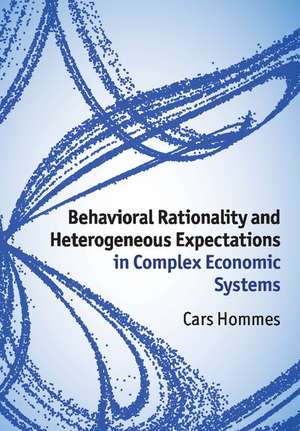Behavioral Rationality and Heterogeneous Expectations in Complex Economic Systems
Autor Cars Hommesen Limba Engleză Paperback – 7 oct 2015
| Toate formatele și edițiile | Preț | Express |
|---|---|---|
| Paperback (1) | 299.62 lei 43-57 zile | |
| Cambridge University Press – 7 oct 2015 | 299.62 lei 43-57 zile | |
| Hardback (1) | 455.11 lei 22-36 zile | +28.88 lei 5-11 zile |
| Cambridge University Press – 23 ian 2013 | 455.11 lei 22-36 zile | +28.88 lei 5-11 zile |
Preț: 299.62 lei
Nou
Puncte Express: 449
Preț estimativ în valută:
57.35€ • 62.32$ • 48.21£
57.35€ • 62.32$ • 48.21£
Carte tipărită la comandă
Livrare economică 21 aprilie-05 mai
Preluare comenzi: 021 569.72.76
Specificații
ISBN-13: 9781107564978
ISBN-10: 1107564972
Pagini: 272
Ilustrații: 93 b/w illus.
Dimensiuni: 170 x 244 x 14 mm
Greutate: 0.44 kg
Editura: Cambridge University Press
Colecția Cambridge University Press
Locul publicării:New York, United States
ISBN-10: 1107564972
Pagini: 272
Ilustrații: 93 b/w illus.
Dimensiuni: 170 x 244 x 14 mm
Greutate: 0.44 kg
Editura: Cambridge University Press
Colecția Cambridge University Press
Locul publicării:New York, United States
Cuprins
1. Introduction; 2. Bifurcations and chaos in 1-D systems; 3. Bifurcations and strange attractors in 2-D systems; 4. The nonlinear cobweb model; 5. The cobweb model with heterogeneous expectations; 6. An asset pricing model with heterogeneous beliefs; 7. Empirical validation; 8. Laboratory experiments.
Recenzii
'Professor Hommes' work is a major contribution to the understanding of intertemporal economic fluctuations. In a world in which production and investment behavior is motivated by expectations of the future, the way those expectations are formed becomes of the utmost importance. These expectations lead to dynamic systems, and the author draws on the rich literature developed for the study of mechanical and gravitational phenomena. These lead to the emergence of very complex behavior in markets driven by expectations, especially when different economic agents have different modes of forming expectations from data. The study of this book will have a profound impact on the theoretical and empirical analysis of securities markets and other forms of investment.' Kenneth J. Arrow, Joan Kenney Professor of Economics and Professor of Operations Research, Emeritus, Stanford University, and Winner of the Nobel Prize in Economics, 1972
'Cars Hommes has written an excellent book that is a combination of theory, economic modeling and economic experiments. The book is an outgrowth of a course on nonlinear economic dynamics that he has given mostly at the University of Amsterdam for the last 20 years.' Carl Chiarella, Head, Finance Discipline Group, University of Technology, Sydney
'Cars Hommes' excellent book puts us firmly back on the path that we should have followed had we heeded Poincaré's warnings and built our economic theory on the foundations that he laid. The book's careful formal analysis, empirical and experimental evidence provides a solid basis for understanding the volatile evolution of economies. It provides the framework for a better understanding of how economies do actually behave rather than how current economic theory says they should behave. This book could not have come at a more opportune moment.' Alan Kirman, Professor Emeritus of Economics, Université d' Aix-Marseille III, and Director of Studies, Ecole des Hautes Etudes en Sciences Sociales
'Assumptions about the homogeneity of individuals' expectations have limited economic modeling for some time. In this very complete book, Cars Hommes shows the reader how the world of heterogeneous expectations works in several different contexts. It distinguishes itself by covering theory along with empirical and experimental validation. Researchers interested in getting up to speed in this relatively new area of economics will find this book an excellent overview and tutorial.' Blake LeBaron, Abram L. and Thelma Sachar Chair of International Economics, Brandeis University
'Without doubt, rational expectations has been a powerful and useful assumption in pushing applied work forward in the last 40 years. But positing that agents have heterogeneous beliefs that deviate from the measure implied by a model opens up new possibilities that promise to allow us to resolve some of our many remaining puzzles about asset prices and quantities. Cars Hommes' book is a leading example of how productive this approach can be.' Thomas J. Sargent, W. R. Berkley Professor of Economics and Business, New York University, Senior Fellow, Hoover Institution, Stanford University, and Winner of the Nobel Prize in Economics, 2011
'Cars Hommes has written an exciting book that will help students, researchers and policy-makers to formulate their own realistic behavioral rationality models with heterogeneous expectations. I can highly recommend reading it. This book is undoubtedly also suitable for teaching nonlinear economic dynamics with a strong behavioral flavor at Master or PhD level. Even advanced Bachelor students should be able to learn some important lessons.' Journal of Economics and Statistics
'Cars Hommes has written an excellent book that is a combination of theory, economic modeling and economic experiments. The book is an outgrowth of a course on nonlinear economic dynamics that he has given mostly at the University of Amsterdam for the last 20 years.' Carl Chiarella, Head, Finance Discipline Group, University of Technology, Sydney
'Cars Hommes' excellent book puts us firmly back on the path that we should have followed had we heeded Poincaré's warnings and built our economic theory on the foundations that he laid. The book's careful formal analysis, empirical and experimental evidence provides a solid basis for understanding the volatile evolution of economies. It provides the framework for a better understanding of how economies do actually behave rather than how current economic theory says they should behave. This book could not have come at a more opportune moment.' Alan Kirman, Professor Emeritus of Economics, Université d' Aix-Marseille III, and Director of Studies, Ecole des Hautes Etudes en Sciences Sociales
'Assumptions about the homogeneity of individuals' expectations have limited economic modeling for some time. In this very complete book, Cars Hommes shows the reader how the world of heterogeneous expectations works in several different contexts. It distinguishes itself by covering theory along with empirical and experimental validation. Researchers interested in getting up to speed in this relatively new area of economics will find this book an excellent overview and tutorial.' Blake LeBaron, Abram L. and Thelma Sachar Chair of International Economics, Brandeis University
'Without doubt, rational expectations has been a powerful and useful assumption in pushing applied work forward in the last 40 years. But positing that agents have heterogeneous beliefs that deviate from the measure implied by a model opens up new possibilities that promise to allow us to resolve some of our many remaining puzzles about asset prices and quantities. Cars Hommes' book is a leading example of how productive this approach can be.' Thomas J. Sargent, W. R. Berkley Professor of Economics and Business, New York University, Senior Fellow, Hoover Institution, Stanford University, and Winner of the Nobel Prize in Economics, 2011
'Cars Hommes has written an exciting book that will help students, researchers and policy-makers to formulate their own realistic behavioral rationality models with heterogeneous expectations. I can highly recommend reading it. This book is undoubtedly also suitable for teaching nonlinear economic dynamics with a strong behavioral flavor at Master or PhD level. Even advanced Bachelor students should be able to learn some important lessons.' Journal of Economics and Statistics
Notă biografică
Descriere
Recognising that the economy is a complex system with boundedly rational interacting agents, applies complexity modelling to economics and finance.










